Films with theme "L'usurpation d'identité", sorted by revenue
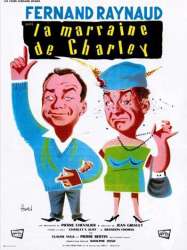
La Marraine de Charley (1959)
Directed by Pierre Chevalier
Origin France
Genres Comedy
Themes Films about sexuality, Théâtre, L'usurpation d'identité, Transgender in film, Films based on plays, Escroquerie, LGBT-related film, Cross-dressing in film
Actors Monique Vita, Pierre Bertin, Florence Blot, Sacha Briquet, Jean-Pierre Cassel, Germaine Delbat
Cohabitant à l'étroit chez Charley, étudiant en architecture, quatre de ses amis le contraignent à s'habiller en femme et à jouer le rôle de sa propre marraine pour louer à bas prix l'hôtel particulier de M. de Saint-Sevran. D'où une succession de quiproquos et de situations cocasses qui ne se termineront qu'à l'arrivée de la vraie marraine.
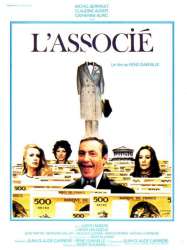
The Associate (1979)
, 1h34Directed by René Gainville
Genres Comedy
Themes L'usurpation d'identité, Escroquerie
Actors Michel Serrault, Claudine Auger, Catherine Alric, Daniel Prévost, Judith Magre, Henri Virlogeux
Après avoir été licencié de l'agence de publicité où il travaillait, Julien Pardot décide d'ouvrir un cabinet de conseils financiers.

The Marquis (2011)
, 1h28Directed by Dominique Farrugia
Genres Comedy, Crime
Themes L'usurpation d'identité, Buddy films, Escroquerie
Actors Franck Dubosc, Richard Berry, Jean-Hugues Anglade, Luisa Ranieri, Frédéric Bouraly, Sara Martins
À l'occasion d’un braquage qui tourne mal place Vendôme à Paris, Quentin Tasseau, petit truand qui envisage de « se retirer des affaires », se fait voler l'argent de sa mallette-appât par un directeur d'agence bancaire peu scrupuleux. Tasseau parvient néanmoins à s'enfuir avant l’arrivée de la police. Mais Jo, chef de bande, ne lui pardonne pas ce casse qui se termine par un « excédent bancaire » car c'est lui qui avait avancé les cent mille euros que contenait la mallette. Tasseau, menacé de mort, veut se racheter et a une idée…
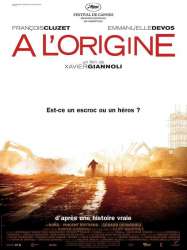
In the Beginning (2009)
, 2h10Directed by Xavier Giannoli
Origin France
Genres Drama
Themes L'usurpation d'identité, Escroquerie
Actors François Cluzet, Gérard Depardieu, Emmanuelle Devos, SoKo, Brice Fournier, Vincent Rottiers
The film tells the dramatized true story of Philippe Berre, an actual Frenchman with a reputation as an impostor. In the film, much as actual events, Monsieur Berre goes to a small town, passing himself off as a civil engineer, and claims that the government has decided to start previously scrapped plans for the construction of a highway. He commissions supplies, gains construction vehicles, and brings jobs to the community and actually constructs a section of roadway in the process before being discovered.

Identity Theft (2004)
, 1h30Directed by Robert Dornhelm
Origin Canada
Genres Drama, Crime
Themes L'usurpation d'identité, Escroquerie
Actors Kimberly Williams-Paisley, Annabella Sciorra, Jason London, John Kapelos
Michelle Brown s'apprête à acheter la maison de ses rêves ; un jour, elle apprend qu'une femme, Connie Volkos, a usurpé son identité pour mieux dilapider son argent et mener une vie qu'elle ne pourrait pas s'offrir ; Connie développe également une fascination malsaine pour sa victime. Un combat commence alors pour Michelle où elle doit sans cesse se justifier et prouver qu'elle est la véritable Michelle Brown. Un jour, à court d'argent, Connie est arrêtée pour trafic de drogue, puis relâchée sous caution, mais c'est Michelle qui risque d'aller en prison à sa place.

The Elder Son (1975)
, 2h12Directed by Vitali Melnikov
Origin Russie
Genres Drama, Comedy-drama
Themes L'usurpation d'identité, Escroquerie
Actors Evgueni Leonov, Nikolai Karachentsov, Mikhaïl Boïarski, Svetlana Krutchkova

In the Shadow of Iris (2016)
, 1h39Directed by Jalil Lespert
Origin France
Genres Drama, Thriller
Themes Films about sexuality, L'usurpation d'identité, Erotic films, BDSM in films, Films about prostitution, Erotic thriller films, Escroquerie, Striptease
Actors Romain Duris, Charlotte Le Bon, Jalil Lespert, Adel Bencherif, Camille Cottin, Sophie Verbeeck
Iris, la femme d’Antoine Doriot, un riche banquier, disparaît en plein Paris. Max, un jeune mécanicien endetté, pourrait bien être lié à son enlèvement. Mais les enquêteurs sont encore loin d’imaginer la vérité sur l’affaire qui se déroule sous leurs yeux.

Tomboy (2011)
, 1h24Directed by Céline Sciamma
Origin France
Genres Drama, Comedy-drama
Themes L'adolescence, Films about children, Feminist films, Politique, Films about sexuality, L'usurpation d'identité, Bisexuality-related films, LGBT-related films, La sexualité des mineurs, Transgender in film, Political films, Teen LGBT-related films, Escroquerie, LGBT-related films, LGBT-related film, Lesbian-related films
Actors Mathieu Demy, Malonn Lévana, Sophie Cattani
Laure is a 10-year-old child whose family moves to a new address in Paris. One day Laure sees a group of boys playing outside the window and goes to play with them, but they disappear quickly. Instead, Laure meets Lisa, a neighborhood girl, and Laure introduces himself as Mikäel. Lisa then introduces Mikäel to the rest of the neighborhood children stating that "he" is the new kid in the apartment complex. A bath scene in the film reveals that Mikäel has a vagina, and a following scene confirms that Mikäel was assigned female at birth as his mom addresses him and his sister as "girls." Mikäel becomes friends with Lisa and the boys and tries to hide his genitalia to appear like a boy (make it seem that he has a penis). At one point this leads Mikäel to pee his pants, which originally makes him embarrassed, but is soon forgotten. As they all play, Lisa and Mikäel develop crushes on each other and after swimming one day, Lisa kisses him. At this point, Mikäel also seems to be accepted into the group of boys.

The Virtuous Scoundrel (1953)
, 1h25Directed by Sacha Guitry, François Gir
Origin France
Genres Drama, Comedy, Comedy-drama
Themes Films about sexuality, L'usurpation d'identité, Erotic films, Films about prostitution, Erotic thriller films, Escroquerie, Jumeaux ou jumelles
Actors Michel Simon, Louis de Funès, Marguerite Pierry, François Guérin, Laurence Badie, Claude Gensac
Albert et Alain Ménard-Lacoste sont frères jumeaux. Le premier, Albert, a réussi sa vie : il est devenu un homme riche et respectable, craint de son entourage et menant une vie infernale à sa famille ; il est pourtant malheureux au fond de lui-même, sans aucunement vouloir le reconnaître. Le second, Alain, a beaucoup voyagé et vit très modestement. Lors d'un entretien entre les deux frères, Alain est brusquement emporté par un infarctus. Albert va alors endosser les habits et la personnalité de son frère, pour essayer de vivre la vie pleine d'aventures que son défunt frère a vécue au travers de nombreuses expériences en Amérique, une vie pleine de romantisme et de femmes, bien loin de l'univers guindé et monotone qu'Albert s'est construit, dans une rigidité d'« honnête homme », rempli de suffisance et de mépris pour ceux qui, comme son frère Alain, ont préféré les tumultes d'une vie incertaine, et pourtant pleine de goût et de souvenirs. Accueilli comme "Alain", l'héritier d'Albert, sa femme, Madeleine, croyant son mari réellement mort et n'agissant que par intérêt, veut épouser son nouveau "beau-frère". Le médecin de famille découvre alors la supercherie, poussant Albert à disparaître sans laisser de traces.

Gentlemen of Fortune (1971)
, 1h24Origin Russie
Genres Drama, Comedy, Crime
Themes L'usurpation d'identité, Escroquerie
Actors Evgueni Leonov, Georgy Vitsin, Savely Kramarov, Radner Mouratov, Nikolay Olyalin, Erast Garine
The movie follows the story of an amiable kindergarten director named Troshkin who looks exactly like a cruel criminal nicknamed Docent (Доцент, literally associate professor) that has stolen Alexander the Great's helmet at an archaeological excavation. Docent and his gang are caught by police, but Docent is imprisoned in a different jail than his mates. Since Troshkin looks identical to Docent, the police send him undercover to prison with the real criminals to get information about the stolen helmet. He must pretend to be the real felon Docent, so in order to be convincing, Troshkin, a well-educated and good-natured man, has to learn slang and manners of criminals.

Mr. Klein (1976)
, 2h3Directed by Joseph Losey
Origin France
Genres Drama, War, Thriller, Historical, Crime
Themes Films about religion, L'usurpation d'identité, Political films, Films about Jews and Judaism, Escroquerie, Histoire de France, L'Occupation allemande en France, La condition juive en France sous l'Occupation allemande
Actors Alain Delon, Michael Lonsdale, Jeanne Moreau, Juliet Berto, Francine Bergé, Jean Bouise
Paris, January 1942. France is occupied by the Nazis. Robert Klein, apparently apolitical, is a well-to-do art dealer, Roman Catholic and Alsatian by birth, who takes advantage of French Jews who need to sell artworks to raise cash to leave the country. One day, the local Jewish newspaper, addressed to him, is delivered to his home. He learns that another Robert Klein who has been living in Paris, a Jew sought by the police, has had his mail forwarded to him in an apparent attempt to destroy his social reputation and make him a target of official anti-Semitism. He reports this to the police who remain suspicious that he may be reporting this scheme to disguise his own true identity. His own investigations lead him in contradictory directions, to Klein who lives in a slum while having an affair with his concierge and to Klein who visits a palatial country estate where he has seduced an apparently Jewish married woman. When the art dealer cannot locate the other Klein, authorities require him to offer proof of his French heritage. While waiting for the documentation to arrive, he struggles to track down his namesake and learn his motivation. Before he can resolve the situation by either means, he is caught up in the July 1942 roundup of Parisian Jews. He is reunited with Jews who once were his clients as they board boxcars for Germany.
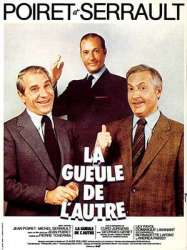
The Other One's Mug (1979)
Directed by Pierre Tchernia
Origin France
Genres Comedy, Crime
Themes L'usurpation d'identité, Escroquerie
Actors Michel Serrault, Jean Poiret, Curd Jürgens, Bernadette Lafont, Andréa Parisy, Paulette Dubost
The film starts in 1978 Paris. In the middle of the presidential election, Martial Perrin, president of the "parti centriste des Conservateurs Indépendants Progressistes" (CIP), learns that Richard Krauss, an old mercenary convicted for taking violent action against the Djibouti government when the latter was still a French colony, has escaped from prison. In his trial, he had publicly promised to kill every man who had stood in the way of his Coup d'état. Martial Perrin is one of those men.
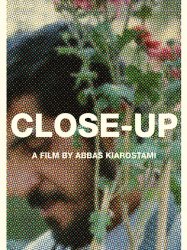
Close-Up (1990)
, 1h34Directed by Abbas Kiarostami
Origin Iran
Genres Drama, Documentary, Crime
Themes L'usurpation d'identité, Escroquerie
Actors Mohsen Makhmalbaf, Abbas Kiarostami, Abolfazl Ahankhah
Hossain Sabzian is a cinephile, and in particular a big fan of popular Iranian director Mohsen Makhmalbaf. One day, Sabzian is riding a bus with a copy of the novel The Cyclist; Mrs. Ahankhah sits next to him, revealing she is a fan of the novel's film adaptation. Sabzian tells her that he himself is Makhmalbaf, the maker. She is then surprised that a famous director would ride public transportation; Sabzian explains in response (posing as Makhmalbaf) that he finds his film subjects this way, telling her that art must spring from life. Posing as Makhmalbaf from this point on, Sabzian visits the Ahankhah family several times over the next two weeks. He flatters them by saying he wants to use not only their house in his next film, but also their sons as actors in it. He even obtains a substantial amount of money from them (ostensibly to prepare for the film). Mr. Ahankhah has his suspicions, however, especially when a magazine photo shows a younger Makhmalbaf with darker hair than that of Sabzian. He invites a journalist (Hossain Farazmand) over, who confirms Sabzian is indeed an impostor. The police come to arrest Sabzian, while Farazmand takes several pictures for his upcoming article: "Bogus Makhmalbaf Arrested." Kiarostami intersperses these scenes throughout the film, in which the events described above do not progress chronologically; they are re-enactments.

The Chameleon (2010)
, 1h42Directed by Jean-Paul Salomé
Origin France
Genres Drama, Thriller
Themes L'usurpation d'identité, Escroquerie
Actors Marc-André Grondin, Famke Janssen, Ellen Barkin, Emilie de Ravin, Tory Kittles, Brian Geraghty
A young man (Marc-André Grondin) in Spain shaves off all his body hair and turns himself in to the police. The man claims to be a 16-year-old boy from Louisiana named Nicholas Mark Randall, who had been missing for four years. His story is that he was kidnapped by a child prostitution ring in France who physically altered his appearance, including changing his eye color.
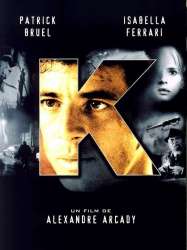
K (1997)
, 2h15Directed by Alexandre Arcady
Genres Thriller, Crime
Themes Assassinat, L'usurpation d'identité, Escroquerie
Actors Patrick Bruel, Isabella Ferrari, Marthe Keller, Pinkas Braun, Jean-François Stévenin, Pierre Abbou
Samuel Bellamy, jeune inspecteur de police, est lié d'amitié avec Joseph Katz, un vieux brocanteur juif rescapé des camps de la mort. Samuel et Joseph aiment jouer aux échecs, mais un matin dans le magasin de Joseph, alors que Samuel venait de perdre contre ce dernier, un Allemand entre dans la brocante. Joseph reconnaît Rudi Guter, un ancien officier SS qui a massacré sa famille pendant la guerre. Guter reconnaît Joseph à cause d'une tache de naissance derrière son oreille gauche. Les deux hommes se battent dans le magasin alors que Samuel essaye de gagner la brocante pour tenter de les arrêter. Mais trop tard, Guter, n'étant pas venu seul, appelle ses hommes au secours, Katz sort un pistolet et l'abat sous les yeux de Sam. Katz finalement arrêté par la police, Sam doit se charger de l'amener au commissariat mais ne voulant pas qu'il soit jugé, il libère son vieil ami et veut le confier à son père qui doit partir en Israël.
 Connection
Connection